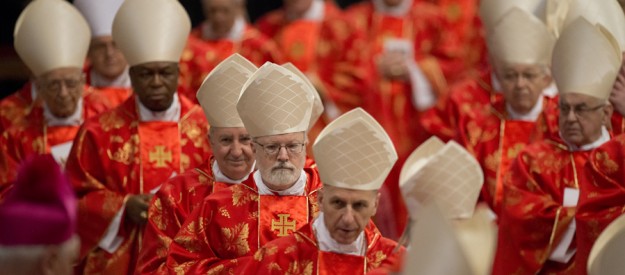"We are losing our attitude of wonder, of contemplation, of listening to creation and thus we no longer manage to interpret within it what Benedict XVI calls 'the rhythm of the love-story between God and man.'"
+ Pope Francis
The rise of the Global South

Since the elevation of Pope Francis to the papacy in 2013, Catholics in the Global South have seen their influence grow in both internal pastoral debates and in the Church’s dialogue with the world, especially on matters of ecology and climate change.
You can tell something is happening just from the growing use of the terms Global North and South rather than First-World, Third-World, Developing, and Developed Nations. (Dr. Celia Deane-Drummond provides helpful context about all this in her interview with Catholic Ecology.)
Catholic ecologists should be familiar with Cardinals Peter Turkson of Ghana and Luis Tagle of Manilla. Turkson, the president of the Pontifical Council of Justice and Peace, headed up much of the drafting and rollout of Laudato Si’. Tagle has likewise been a key voice in the Church’s engagement of ecology, especially after after his appointment this year as head of the Church’s charitable arm Caritas Internationalis.
Both cardinals have contended with significant social and environmental destruction in their respective nations. Both cardinals have appealed for effective agreements from the upcoming "COP21" United Nation's climate negotiations.
And, of course, both cardinals represent a great many others in their nations—clerical, religious, and lay—as evidenced in this candid video plea of the Catholic South to their kin in the United States.
In other battles over Western influence, the ongoing intrigue of the 2015 Synod of Bishops on the Family has also found the Global South playing increasingly greater roles in the life of the Church.
Significant statements continue to be made in the synod’s deliberations by Cardinal Robert Sarah of Guinea, Prefect of the Congregation for Divine Worship and the Discipline of the Sacraments (who was appointed by Benedict XVI), as well as Cardinal Wilfrid F. Napier of Durban, South Africa, and Tanzanian Bishop Renatus Leonard Nkwande.
These and other African clerics have exhorted synod delegates to maintain doctrinal purity, especially in matters related to homosexual unions and the divorced and remarried.
As recently voiced by Cardinal Napier, African bishops have decried what they have called "ideological colonization" over these issues much the same way that Catholics of the Global South have urged their brothers and sisters in the Global North to do a better job tending God’s creation and helping poorer nations respond to the impacts of climate change.
From the perspective of many in the West—with its clumsy ideologies of liberal and conservative politics—ecclesial positions for the environment and against sanctioning new forms of human relationships may seem at cross purposes. But what we are hearing from the Global South are consistent exhortations to abide by both the laws of nature and natural law, since they are the laws of the same Creator.
Dr. David Cloutier made this point a year ago in an interview for Catholic Ecology. In discussing the link between environmental and sexual ethics, Dr. Cloutier highlighted the dangers of unrestrained consumption in its broadest sense:
What I would say to conservatives is that the desire to have the kind of destructive capitalism that we have and to somehow assume that a large majority of people will not lead pretty reckless, wasteful sexual lives is just … unrealistic. It doesn’t match with the reality that most people typically experience.
On the flip side, people who want to believe that we can tolerate the reckless sexual economy while reining in the larger business economy, and making that environmentally sustainable, have not figured out the extent to which real stewardship requires discipline—at a fundamental level ... When I say discipline, I mean discipline in work, discipline in raising children, discipline in thinking through mature relationships. I don’t see how you can expect the kind of discipline that is necessary for environmental sustainability to come about without some kind of discipline in the sexual economy.
The difficulty is that the vast majority of people seem to be on one side of this divide or the other. They want to tolerate—or even embrace—the recklessness of one but then criticize the recklessness on the other side.
I made a similar point earlier this year: what’s needed in matters of environmental protection and in sexual lifestyles is sacrificial self-restraint—that is, living the virtues in ways that can only come when we encounter God's grace.
The call to embrace sacrificial self-restraint is at the heart of what we are hearing from the Global South. These messages consistently connect our duties toward the environment and toward the human person, as we heard from Benedict XVI and now Pope Francis.
The coming days and weeks will tell us how well the world and the Church are listening to the voices of the South—about marriage and about climate change. But one thing is certain now: the Global North and the industrial West had better get used to sharing the influence about how things get done.


















